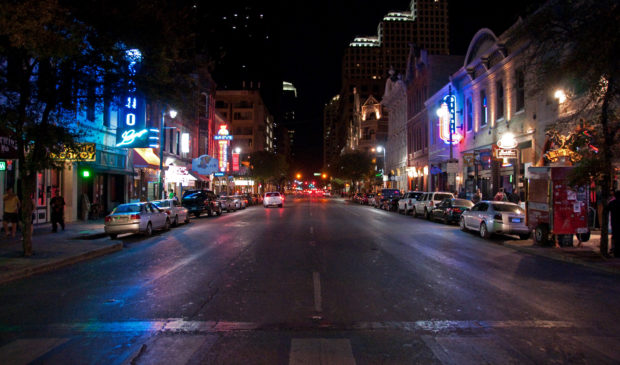Chacon highlights priorities for Safer Sixth Street plan
Monday, January 10, 2022 by
Chad Swiatecki Austin’s police chief has highlighted a handful of action steps as the most important things the police department can do to improve safety in the Sixth Street entertainment district, in the wake of a summer mass shooting that killed an out-of-state tourist.
At the end of last month, Police Chief Joseph Chacon released a memo updating City Council and staff on progress on the 13 action steps recommended by Council in a July resolution. Those steps included improving lighting and pedestrian infrastructure, improving coordination among city departments related to district issues, and encouraging daytime commerce and events not primarily focused around drinking in the many bars that line the street.
In a media briefing following the release of the memo, Chacon said he sees the most potential in action steps such as creating a permanent location for emergency response teams, establishing an entertainment license system for nightlife businesses and improving barricading for the area.
Earlier updates to boards and commissions had highlighted early wins for the initiative known as Safer Sixth Street, including progress on getting illegal guns off the street. In his recent comments, Chacon said he wanted to concentrate on the most “impactful” steps but said the overall goal of improving the district will take time.
“We’re not going to have overnight change that’s going to happen in the area. Even as we continue to put our safety measures in place, we continue to see things happen in our entertainment district on the weekends,” he said. “We have to continue to evolve and really look at the measures that are available to us from that holistic perspective.”
On the prospect of changing the character of the entertainment district away from the emphasis on alcohol-fueled nightlife, Chacon said improving safety is a key consideration for encouraging activities such as public markets and other commercial activity.
“It is a big ask, but when we’re talking about safety it’s important for people to be able to rely on the police department, and we’re going to step up to the challenge. Certainly the characteristics of the street and that atmosphere that you’re talking about has been built out over many years, and it’s going to have a change. It’s going to take some time for that change to occur, but I am concerned about making sure people feel safe.”
Council’s July resolution is the latest of many attempts in at least the past two decades to improve the safety and character of the Sixth Street district. One of the more recent pushes came in 2014 when a plan to make infrastructure improvements, including wider festival-style sidewalks throughout the area, drew much favor from business and property owners in the area.
That revamp plan was even considered for city bond funding, but it lost momentum following the change to district representation on Council, which brought in a number of new elected officials at once.
Molly Alexander, executive director of the Downtown Austin Alliance Foundation, has been involved with analysis and improvement efforts related to Sixth Street since 2003, and said the city has largely neglected the area that has becoming an international calling card for Austin.
“The first question we have to ask is, how are we managing the street today, and what needs to change? If you were doing a marathon or a special event you would be required as an event producer to provide a lot of stuff like bathrooms, emergency vehicle access, barricades, security … we close down the street every weekend and don’t expect the same things of the city that we expect of private event producers, and it’s like a party and special event every Thursday, Friday and Saturday,” she said.
“As they think about how they police and manage the street in a holistic way as a big part of the nighttime economy, look at what else is needed. One part of that is thinking about how you coordinate your security and have them connected to the police while dealing with parking and Uber and everything else, and the city is looking at that.”
Photo made available through a Creative Commons license. This story has been changed since publication to correct a word.
The Austin Monitor’s work is made possible by donations from the community. Though our reporting covers donors from time to time, we are careful to keep business and editorial efforts separate while maintaining transparency. A complete list of donors is available here, and our code of ethics is explained here.
You're a community leader
And we’re honored you look to us for serious, in-depth news. You know a strong community needs local and dedicated watchdog reporting. We’re here for you and that won’t change. Now will you take the powerful next step and support our nonprofit news organization?











